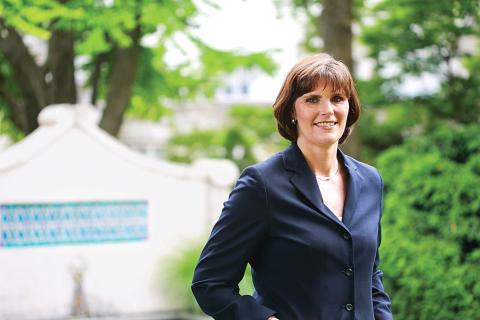A Bi-College Arts Collaborative
President Cassidy on the history and vibrancy of our performing arts.

Dear Friends: When I enter the back door of Taylor in April on my way to my office, I pass a bulletin board covered by posters for upcoming arts events at Bryn Mawr and Haverford. Over the course of April, these included the Bryn Mawr-Haverford Chorale’s performance of Michael Tippett’s A Child of Our Time, three seniors’ vocal or instrumental recitals and performances of two senior thesis music compositions (collectively by three Bryn Mawr and two Haverford students), two Bryn Mawr Reading Series readings by guest authors, the Bi-Co Theater Program’s performance of Jeremy Gable’s Particular Risk, the spring concert of the Bi-Co Orchestra, the BiCo Student Spring Dance Concert, and the Haverford Fine Arts Department theses exhibit displaying the work of six Bryn Mawr and two Haverford seniors.
Long lists are not ordinarily interesting, but the one above tells great stories. It communicates the vibrancy of creative and performing arts at Bryn Mawr and Haverford and the success of a 35-year-old Bi-College agreement to collaborate in our arts programming. Hundreds of students from each campus participate each year in academic or co-curricular arts programs (as well as hundreds of others in student-run organizations such as a cappella groups, Greasepaint Productions [musical theater], the Art Club, and the TriCo Rhythm N’ Motion Dance Company). Among current Bryn Mawr juniors and seniors, 13 have declared independent majors in creative writing, theater, or dance, in addition to 14 in fine arts and three in music at Haverford.
Creation of a Bi-College approach to the arts was in some sense a child of necessity, born during a time of tight budgets. Thirty-five years later, the five programs have grown in size and quality. Faculty take advantage of our proximity to Philadelphia to bring instructors and performers to campus to enrich our offerings.
Added and/or renovated facilities, especially the 2007–09 renovation of Goodhart, have provided enhanced performance opportunities at Bryn Mawr for theater and dance. A new facility for visual culture, arts, and media is slated to open at Haverford later in 2017, and Haverford plans to renovate its music facilities within the next five years.
Most important, the arts programs have been led by talented faculty who see a liberal arts college as a rich environment in which they and their students can learn and create. In describing the arts program, Bryn Mawr’s faculty write, “Chemists and philosophers and students of ancient literature sing together, draw together, dance together, sit down together to study a novel or a play. Everyone brings a different perspective to the table; everyone grows intellectually and artistically from these exchanges.” The faculty’s commitment to pursuing the arts in a liberal arts context is reflected in the long tenure of so many, such as Linda Caruso Haviland, who founded the dance program at Bryn Mawr in 1984; Mark Lord, director of the theater program since 1987; Tom Lloyd, director of the choral and vocal studies programs for Haverford and Bryn Mawr since 1996, who will be much missed following his retirement this spring; and many of their colleagues.
Some of our students will go on to professional careers as artists, performers, or writers. Most will not pursue this path, but I hope they will find time to continue to sing, dance, write, perform, paint, and create, enriching their future communities as they have these two small, amazing campuses outside Philadelphia.
With all good wishes,
Kim Cassidy
President
Published on: 05/14/2017
